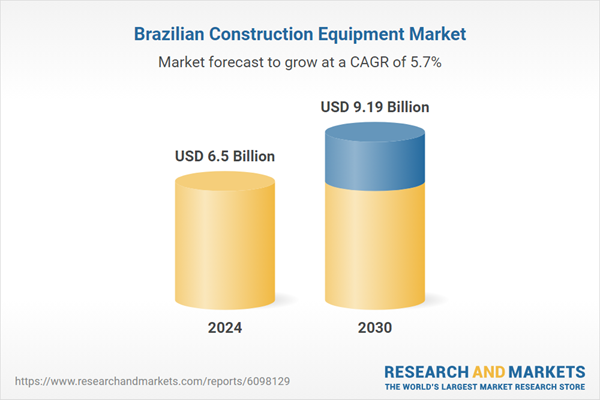With the majority of the population living in cities, the rapid expansion of urban infrastructure, including building construction and installation & maintenance of public infrastructure and urban mobility, also impels the demand for construction equipment industry in the country. Technological advancements are revolutionizing the market, with a strong focus on efficiency, sustainability, and automation. The demand for electric and hybrid machinery is primarily driven by stringent environmental regulations and rising fuel costs, prompting manufacturers to develop energy-efficient alternatives.
Innovations such as telematics and IoT integration are becoming industry standards, enabling real-time monitoring, predictive maintenance, and enhanced operational efficiency. These technologies help reduce downtime, improve fuel consumption, and enhance fleet management for construction firms. In addition, automation and autonomous equipment, including drones and self-operating bulldozers, are transforming large-scale projects by improving precision, safety, and productivity. The adoption of digital tools like Building Information Modeling (BIM) is also increasing, facilitating better project planning, collaboration, and cost control. Furthermore, the use of advanced materials in machinery construction enhances durability, reduces maintenance requirements, and improves fuel efficiency, ultimately fostering smarter and more sustainable construction practices.
The Brazil construction equipment industry is set for significant expansion, driven by large-scale government investments in infrastructure. The government's initiatives focus on enhancing transportation networks, urban development, and energy projects, creating a strong demand for construction machinery such as excavators, bulldozers, cranes, and concrete mixers. By prioritizing modernization and expansion, these projects aim to improve connectivity, boost economic growth, and attract domestic and foreign investments.
In December 2024, Eldorado do Sul's mayor authorized the creation of Scala AI City, the first data center city in Latin America, in collaboration with Scala Data Centers. The project aims to establish a major digital infrastructure and AI hub. It includes expanding the urban perimeter and simplifying bureaucratic procedures to create a business-friendly environment for data center operations. An initial investment of USD 500 million is expected to generate over 3,000 direct and indirect jobs, boosting the local economy and positioning Brazil as a leader in technological innovation.
However, Brazil's construction equipment industry is highly sensitive to economic fluctuations, with inflation, interest rates, and currency depreciation significantly shaping demand. Rising inflation increases the cost of raw materials and machinery, making construction projects more expensive and less viable. High interest rates further discourage companies from taking loans to invest in new equipment, leading to reduced market growth. In addition, currency depreciation makes imported construction machinery more costly, limiting affordability for contractors and developers.
Brazil Construction Equipment Market Report Segmentation
This report forecasts revenue growth at the country level and provides an analysis of the latest industry trends in each of the sub-segments from 2018 to 2030. For this study, the analyst has segmented the Brazil construction equipment market report based on product, propulsion, equipment, power output, engine capacity, and region.Product Outlook (Revenue, USD Million, 2018-2030)
- Earth Moving Machinery
- Excavators
- Wheel
- Crawler
- Loaders
- Backhoe Loaders
- Skid Steer Loaders
- Crawler/Track Loaders
- Wheeled Loaders
- Dump Trucks
- Moto Graders
- Dozers
- Wheel
- Crawler
- Material Handling Machinery
- Crawler Cranes
- Trailer Mounted Cranes
- Truck Mounted Cranes
- Forklift
- Concrete and Road Construction Machinery
- Concrete Mixer & Pavers
- Construction Pumps
- Others
Equipment Outlook (Revenue, USD Million, 2018-2030)
- Heavy Construction Equipment
- Compact Construction Equipment
Propulsion Outlook (Revenue, USD Million, 2018-2030)
- ICE
- Electric
- CNG/LNG
Power Output Outlook (Revenue, USD Million, 2018-2030)
- < 100 HP
- 101 - 200 HP
- 201 - 400 HP
- >401 HP
Engine Capacity Outlook (Revenue, USD Million, 2018-2030)
- Up to 250 HP
- 250 - 500 HP
- More than 500 HP
This report addresses:
- Market intelligence to enable effective decision-making
- Market estimates and forecasts from 2018 to 2030
- Growth opportunities and trend analyses
- Segment and regional revenue forecasts for market assessment
- Competition strategy and market share analysis
- Product innovation listings for you to stay ahead of the curve
Why Should You Buy This Report?
- Comprehensive Market Analysis: Gain detailed insights into the market across major regions and segments.
- Competitive Landscape: Explore the market presence of key players.
- Future Trends: Discover the pivotal trends and drivers shaping the future of the market.
- Actionable Recommendations: Utilize insights to uncover new revenue streams and guide strategic business decisions.
This product will be delivered within 1-3 business days.
Table of Contents
Companies Mentioned
The major companies featured in this Brazil Construction Equipment market report include:- AB Volvo
- Caterpillar
- Deere & Company
- Hitachi Construction Machinery Co., Ltd.
- J C Bamford Excavators Ltd.
- Liebherr-International Deutschland GmbH
- MANITOU Group
- SANY Group
- Terex Corporation
- XCMG Group
- LBX Company
- Komatsu
Table Information
| Report Attribute | Details |
|---|---|
| No. of Pages | 225 |
| Published | May 2025 |
| Forecast Period | 2024 - 2030 |
| Estimated Market Value ( USD | $ 6.5 Billion |
| Forecasted Market Value ( USD | $ 9.19 Billion |
| Compound Annual Growth Rate | 5.7% |
| Regions Covered | Brazil |
| No. of Companies Mentioned | 13 |









